Peter Dutton: The ex-cop who brought Australia's opposition back from the brink
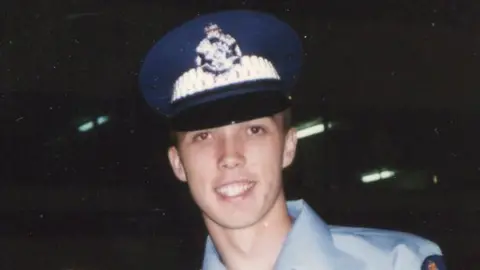 Office of Peter Dutton
Office of Peter DuttonIn 2002, a fresh-faced former policeman stood up in Canberra's Parliament House and introduced himself to the nation.
Peter Dutton warmly thanked the community which had elected him, before launching into a strongly worded speech against crime, trade unions, and refugee advocacy groups.
"As a police officer," he said, "I have seen the best and the worst that society has to offer. I have seen the wonderful, kind nature of people willing to offer any assistance to those in their worst hour, and I have seen the sickening behaviour displayed by people who, frankly, barely justify their existence in our sometimes over-tolerant society."
Dutton vowed to fight for the "forgotten people" of Australia who were "fed up" with the "boisterous minority and the politically correct" - a stance he has steadfastly clung to during his climb to the top of the Liberal-National Coalition.
Sometimes likened to Donald Trump in both policy and rhetoric - a comparison he rejects - the 54-year-old's hard-line brand of conservativism and combative statements made him one of Australian politics' most polarising figures.
But he was also one of its most experienced, with 20 years as an MP under his belt, many of them spent as a senior minister handling key portfolios like health, immigration, defence and home affairs.
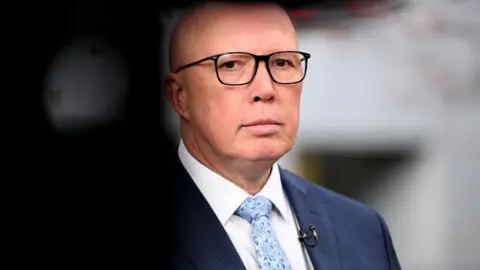 Getty Images
Getty ImagesHe took over leadership of the Coalition after its worst defeat in 70 years, but in only one term made it competitive again, a feat even some on his side of the aisle had thought impossible.
With a 2025 campaign focusing on energy, housing and government efficiency, his goal now was making Labor's Anthony Albanese the first prime minister in almost a century to be voted out after a single term.
Instead, in a double blow to his political career, he lost the election and his seat in the Queensland electorate of Dixon.
From police officer to politician
The eldest of five children, Dutton has always been a "responsible", "straight-down-the-line person", his family say.
He grew up in the suburbs of Brisbane, joining both the Liberal Party and the Queensland Police Force after school - two moves that would shape his world view.
After nine years, including time investigating high-profile violent crimes and a car chase which left him badly injured, he resigned from the force to work with his father on a family business while waitimg for his political breakthrough.
That came in 2001, when he beat Labor frontbencher Cheryl Kernot for the House of Representatives seat of Dickson, catching the eye of then Prime Minister John Howard, who would go on to become Dutton's role model and mentor.
"I was impressed by him from the word go," Howard - the nation's second longest-serving leader - told the Good Weekend Magazine in a 2014 profile.
Dutton quickly climbed the ladder, landing his first ministerial position within three years, and by the time the Coalition returned to power under Tony Abbott in 2013, he was one of the leading conservative voices in the party.
He has taken on an array of portfolios, but it is in immigration, home affairs and defence where he really cemented his reputation.
In immigration and home affairs, he strictly enforced Australia's controversial policy of sending all asylum seekers who arrived in the country by boat to offshore detention centres, and aggressively deflected criticism of the strategy.
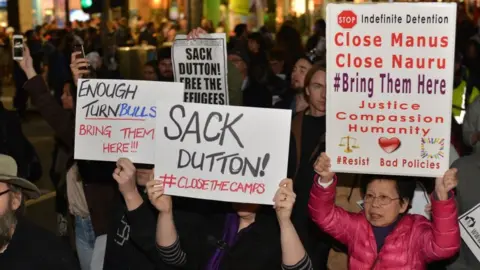 Getty Images
Getty ImagesHe became a frequent critic of China, steadily increased the investigative and surveillance powers of federal law enforcement, and as defence minister helped negotiate the landmark Aukus defence pact with Britain and the United States.
Dutton is also known for his stances on tense debates in Australia.
He was among several politicians who boycotted the 2008 national apology to the Stolen Generations - the name given to tens of thousands of Aboriginal children who were forcibly taken from their families under infamous government policies until 1970 - though he now says that was a "mistake".
And as opposition leader in 2023, he was instrumental in the defeat of the Voice to Parliament referendum - which sought to recognise Aboriginal and Torres Strait Islander people in the constitution and simultaneously establish a parliamentary advisory body for them - arguing the proposal was divisive, constitutionally risky and ultimately would not help improve the lives of Indigenous people.
Dutton has also weathered a string of scandals. He apologised over remarks criticised as racist, been caught on camera appearing to joke about the impact of climate change on the Pacific, and once called a journalist a "mad witch" in an expletive-laden text message that he accidentally sent to the journalist herself.
He has long had great ambitions, in 2018 famously challenging Prime Minister Malcolm Turnbull for the party leadership. Turnbull - who had felled his predecessor Tony Abbott the same way three years earlier - did not have enough votes to win the contest, but neither did Dutton, leaving Scott Morrison to sweep through and take the job of prime minister instead.
Dutton finally ascended to the top job after Morrison led the party to an election wipe-out in 2022.
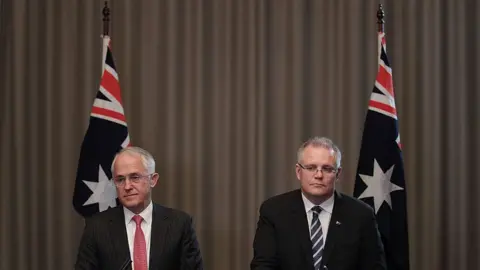 Getty Images
Getty ImagesAt the time, polling painted Dutton as deeply unpopular, and some from his own party questioned whether the conservative firebrand could rebuild Liberal support in the moderate areas they lost it.
Dutton insisted the tough jobs he had held in government had made it hard to "show a softer side or a different side" to his character.
"All I would say is I'm not going to change, but I want people to see the entire person I am and reserve and make their own judgement," he said, in his first news conference as leader.
A softened image and Trump comparisons
More recently however, Dutton tried to project a more mellow image, of a shy, family man, who will govern in the style of his still broadly respected mentor Howard.
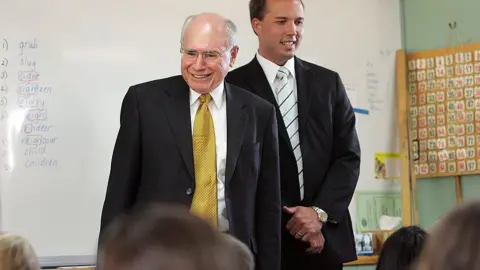 Getty Images
Getty ImagesHe opened up about his personal life, revealing struggles with alopecia, a skin condition which causes hair loss, and what he believes is PTSD from his time in the police.
He told interviewers about his first marriage at the age of 22, which lasted only months, and about his daughter who was born from another short-lived relationship and whom he calls "the best mistake I ever made". He also has two adult sons with his second wife, Kirrily.
He promised to introduce a government efficiency tsar - like Elon Musk is to America - who would cut public service jobs, also took aim at government diversity and inclusion initiatives. However, he sought to distance himself from gender and abortion debates, and has ruled out withdrawing the country from the Paris Climate Accords.
His flagship policy was a nuclear power scheme which he said would help Australia lower its emissions, offer cheaper power than renewables, and create new jobs, at a cost of A$300bn ($189bn; £146bn).
Nuclear power is currently banned - both at a federal level and by many states - and experts, including Australia's science agency, said Dutton's scheme could not have been delivered within the specified timeframe or for that price. Many argued it was a tactic to delay the country's transition away from the lucrative coal and gas industries.
Lowering the cost of living was also a key part of his pitch to voters. Central to that was a promise to fix the housing crisis by slashing construction red tape, cutting immigration and allowing Australians to dip into their superannuation to buy their first home - though critics say bolder reforms which are electorally unpopular with older, wealthier voters are necessary.
Dutton also matched Labor's promise to fund more free doctor appointments, has said state governments will face pressure to stamp out crime, and that Australia's "strained" relationships with the US and Israel will be repaired under his watch.
Albanese argued the coalition under Dutton was "more conservative than they've ever been", and accused him of pursuing "cold-hearted, mean-spirited" politics which target vulnerable people.
"What I want is a campaign that's about policy, substance, that's about hope and optimism for our country," he said when announcing the election, adding that Dutton was "all about fear".
Dutton painted Albanese as "weak" and "woke", and said he has sent Australia backwards - a view the majority of Australians ultimately rejected.
Conceding the election on 3 May 2025, Dutton said it had been an "amazing honour" to have served as an MP for more than 20 years and that defeat was "not the true story of who we are".
"We have an amazing party. It will rebuild."
Additional reporting by Iris Zeng.
